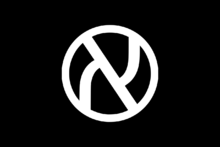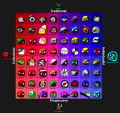imported>StarlingJFF No edit summary |
m (Text replacement - "{{MessageBox.*}}" to "<!--there used to be a message-box here-->") |
||
| (One intermediate revision by one other user not shown) | |||
| Line 1: | Line 1: | ||
<!--there used to be a message-box here--> | |||
{{Ideology | {{Ideology | ||
|themecolor = #141414 | |themecolor = #141414 | ||
| Line 32: | Line 32: | ||
'''Jewish Anarchism''' ('''JewAn''') is the belief that mortal kings and rulers are bound to become tyrants, and that the true "Kingdom under G_d" described in the Torah is anarchy. | '''Jewish Anarchism''' ('''JewAn''') is the belief that mortal kings and rulers are bound to become tyrants, and that the true "Kingdom under G_d" described in the Torah is anarchy. | ||
== Variants == | ==Variants== | ||
=== [[File:SecularJudaAn.png]] Secular Jewish Anarchism === | ===[[File:SecularJudaAn.png]] Secular Jewish Anarchism=== | ||
'''Secular Jewish Anarchism''', also known as '''Jewish Atheist Anarchism''', is a form of Jewish Anarchism that is guided by secular principles than religious principles. Many people of Jewish origin, such as Emma Goldman, Alexander Berkman, Paul Goodman, Murray Bookchin, Volin, Gustav Landauer, David Graeber, and Noam Chomsky have played a role in the history of anarchism. However, as well as these anarchists of Jewish origin, there have also been specifically Jewish anarchist movements, within the Yiddish-speaking communities of Eastern and Central Europe, and the Western cities to which they migrated, from the late nineteenth century until the Second World War. All the members of the first anarchist group in the Russian Empire, which was formed in 1903 in Białystok, were Jews. Yiddish-speaking Jews participated in the International Anarchist Congress of Amsterdam in 1907. | '''Secular Jewish Anarchism''', also known as '''Jewish Atheist Anarchism''', is a form of Jewish Anarchism that is guided by secular principles than religious principles. Many people of Jewish origin, such as Emma Goldman, Alexander Berkman, Paul Goodman, Murray Bookchin, Volin, Gustav Landauer, David Graeber, and Noam Chomsky have played a role in the history of anarchism. However, as well as these anarchists of Jewish origin, there have also been specifically Jewish anarchist movements, within the Yiddish-speaking communities of Eastern and Central Europe, and the Western cities to which they migrated, from the late nineteenth century until the Second World War. All the members of the first anarchist group in the Russian Empire, which was formed in 1903 in Białystok, were Jews. Yiddish-speaking Jews participated in the International Anarchist Congress of Amsterdam in 1907. | ||
=== [[File:Anjew.png]] Religious Jewish Anarchism === | ===[[File:Anjew.png]] Religious Jewish Anarchism=== | ||
'''Religious Jewish Anarchism''' is a form of Jewish Anarchism that is guided by religious principles. While many Jewish anarchists were irreligious or sometimes vehemently anti-religious, there were also a few religious anarchists and pro-anarchist thinkers, who combined contemporary radical ideas with traditional Judaism. Some secular anti-authoritarians, such as Abba Gordin and Erich Fromm, also noticed remarkable similarity between anarchism and many Kabbalistic ideas, especially in their Hasidic interpretation. Some Jewish mystical groups were based on anti-authoritarian principles, somewhat similar to the Christian Quakers and Dukhobors. Martin Buber, a deeply religious philosopher, had frequently referred to the Hasidic tradition. | '''Religious Jewish Anarchism''' is a form of Jewish Anarchism that is guided by religious principles. While many Jewish anarchists were irreligious or sometimes vehemently anti-religious, there were also a few religious anarchists and pro-anarchist thinkers, who combined contemporary radical ideas with traditional Judaism. Some secular anti-authoritarians, such as Abba Gordin and Erich Fromm, also noticed remarkable similarity between anarchism and many Kabbalistic ideas, especially in their Hasidic interpretation. Some Jewish mystical groups were based on anti-authoritarian principles, somewhat similar to the Christian Quakers and Dukhobors. Martin Buber, a deeply religious philosopher, had frequently referred to the Hasidic tradition. | ||
==History== | ==History== | ||
Latest revision as of 03:45, 8 September 2023
Jewish Anarchism (JewAn) is the belief that mortal kings and rulers are bound to become tyrants, and that the true "Kingdom under G_d" described in the Torah is anarchy.
Variants
Error creating thumbnail: Unable to save thumbnail to destination Secular Jewish Anarchism
Secular Jewish Anarchism, also known as Jewish Atheist Anarchism, is a form of Jewish Anarchism that is guided by secular principles than religious principles. Many people of Jewish origin, such as Emma Goldman, Alexander Berkman, Paul Goodman, Murray Bookchin, Volin, Gustav Landauer, David Graeber, and Noam Chomsky have played a role in the history of anarchism. However, as well as these anarchists of Jewish origin, there have also been specifically Jewish anarchist movements, within the Yiddish-speaking communities of Eastern and Central Europe, and the Western cities to which they migrated, from the late nineteenth century until the Second World War. All the members of the first anarchist group in the Russian Empire, which was formed in 1903 in Białystok, were Jews. Yiddish-speaking Jews participated in the International Anarchist Congress of Amsterdam in 1907.
Error creating thumbnail: Unable to save thumbnail to destination Religious Jewish Anarchism
Religious Jewish Anarchism is a form of Jewish Anarchism that is guided by religious principles. While many Jewish anarchists were irreligious or sometimes vehemently anti-religious, there were also a few religious anarchists and pro-anarchist thinkers, who combined contemporary radical ideas with traditional Judaism. Some secular anti-authoritarians, such as Abba Gordin and Erich Fromm, also noticed remarkable similarity between anarchism and many Kabbalistic ideas, especially in their Hasidic interpretation. Some Jewish mystical groups were based on anti-authoritarian principles, somewhat similar to the Christian Quakers and Dukhobors. Martin Buber, a deeply religious philosopher, had frequently referred to the Hasidic tradition.
History
TBA
Personality and Behavior
JewAn is a pious person, but nonetheless an opponent of Error creating thumbnail: Unable to save thumbnail to destination Zionism, viewing Israel as it currently exists as a tyrannical and racist regime. He seeks a "no-state solution" and wants Jews to co-exist with Muslims and Christians in stateless Jerusalem.
How to Draw

- Draw a cube with eyes,
- Colour the cube a very dark grey,
- Draw the Hebrew character Aleph (א) in white on the face,
- (Optional) Draw a kippah on its head (Yellow) and dark grey),
And you're done!
| Color Name | HEX | RGB | |
|---|---|---|---|
| Dark Grey | #141414 | 20, 20, 20 | |
| White | #FFFFFF | 255, 255, 255 | |
| Yellow | #FFD92E | 255, 217, 46 | |
Relationships
Friends
- Error creating thumbnail: Unable to save thumbnail to destination Anarcho-Syndicalism - The backbone of my economic policy.
- Error creating thumbnail: Unable to save thumbnail to destination Religious Anarchism - One God, no masters!
- Error creating thumbnail: Unable to save thumbnail to destination Christian Anarchism - I can respect your devotion to God and smashing the state.
- Error creating thumbnail: Unable to save thumbnail to destination Islamic Anarchism - My Muslim brother and fellow no-state solution enjoyer!
- Error creating thumbnail: Unable to save thumbnail to destination Anationalism - Zamenhof was a Jew and Esperanto was highly influenced by Yiddish!
Frenemies
- Error creating thumbnail: Unable to save thumbnail to destination Labour Zionism - What?
- Error creating thumbnail: Unable to save thumbnail to destination Existentialist Anarchism - You seem sad child.
- Error creating thumbnail: Unable to save thumbnail to destination Mutualism - Overall based, but Proudhoun's antisemitism was cringe.
Enemies
- Error creating thumbnail: Unable to save thumbnail to destination Nazism - Do I even need to say what my problems with you are?!
- Error creating thumbnail: Unable to save thumbnail to destination Anarcho-Fascism - Oh, now the guy above is masquerading as an anarchist. Are you kidding?
- Error creating thumbnail: Unable to save thumbnail to destination Zionism - You're ruining the good name of Y'HW'H with your tyranny! Down with tyrants! No-state solution!
- Error creating thumbnail: Unable to save thumbnail to destination Islamic Theocracy - You're literally just Zionists but with a different religion! The Jews and Muslims will have a stateless homeland!
- Error creating thumbnail: Unable to save thumbnail to destination Anarcho-Nihilism - If you hate our religion, you are an antisemite!
- Error creating thumbnail: Unable to save thumbnail to destination Kogosianism - No, even if you like my people your vision of anarchism is pure garbage!
Further Information
Literature
Online Communities
Wikipedia
Gallery
-
Credit: u/FritzIsNotAnazi, Source
-
Old design
Notes
- ↑ Despite being an atheist, Emma Goldman was born into an Orthodox Jewish family, which affected her beliefs and activism. She was a supporter of the Jewish community against antisemitism throughout her life.


